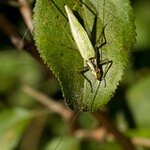
Birds wouldn't be happy in a Trader Joe's, it seems. Stuffed with aisles full of organically grown, gluten-free, range fed deliciousness, birds would see through expensive marketing and know that, nutritionally, organic food is no better, it is just a different process.
And scientist birds would be confused why no one in the food industry knows what the word 'organic' means.
What Is The Meaning Of "organic" (and Inorganic) Food? by professor Lee Silver
Organic vegetables: are they really better than conventionally grown? by Jane Poynter
The Big Organic Questions - What Is Organic Food…


